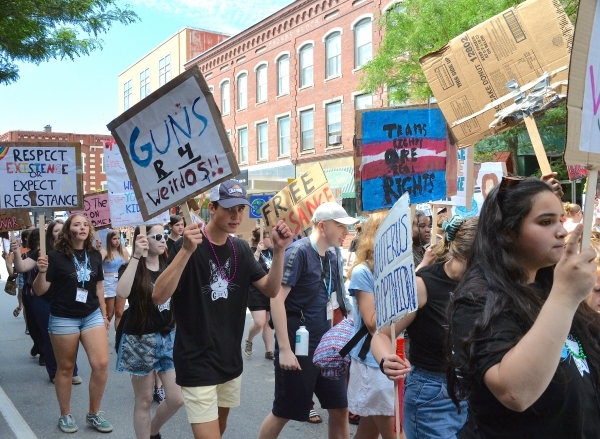PUTNEY — For three decades, Vermont teenagers have gathered at the annual Governor's Institute on Global Issues and Youth Action to talk about hot topics ranging from abortion to zero-tolerance policies.
Even so, some didn't know how to respond to visiting scholar Amer Latif's recent speech title, “Love my enemy! Seriously?”
“It's much easier to say, 'Look at what they've done - we need to take those people down,'” Latif admitted. “But what kind of interactions are possible with those that we disagree with?”
The former Marlboro College professor spoke to an audience of 60 high schoolers all too familiar with a world of increasing political polarization. That's why organizers of the nonprofit institute hosted him as part of their week-long educational enrichment program at Landmark College in Putney.
“How can we find a way to respect each other as human beings so we can move forward together?” said John Ungerleider, the program's director. “I think it's a hard question for all of us, not just students.”
The last time the institute met in person in 2019, Donald Trump was president and Roe v. Wade was law of the land. Three pandemic years later, much has changed - yet much also remains turbulently similar.
Latif said many believe “others” are the root of the problem. He instead pointed to something else.
“Where is that feeling?” he asked students of their indignation. “It's not in the other person. It's inside you.”
Latif used examples from ancient religion and modern science to pull back from individual issues to a bigger picture of the world and its ultimate interdependence.
But the challenges of encouraging everyone to comprehend that and cooperate were seen throughout the institute's schedule, which featured staffers who recently fled from Afghanistan as well as a video call with speakers in war-torn Ukraine.
“We need to work for the right thing,” Latif said, “but we also need to recognize there's a better way of being than what leads to violence.”
The solution? The professor suggested acting like soccer stars.
“Both teams play like everything depends on it, yet at the end, people that you've shoved and pushed and taken down want to help others get up and shake hands,” he said. “Can we say that about our enemies? That life is bigger than just the issue we're interested in? That people are bigger than the view they hold?”
Latif encouraged students to speak out for their positions without attacking those who hold opposing views.
“You engage with the action,” he said, “but you don't judge the other person.”
Understanding and strategy
The Governor's Institute on Global Issues and Youth Action is one of nine programs - others include the arts, astronomy, engineering, entrepreneurship, environmental science, health and medicine, mathematics, and technology - that take place every summer at college campuses statewide.
“We want students to understand what the issues are,” Ungerleider said, “and to develop a strategy for action.”
Teens aimed to do that by creating protest signs to display in Brattleboro's Fourth of July parade. Spectators greeted them with cheers - and a few cries of opposition.
“I'm not saying this is easy, but possibilities exist,” Latif said. “Perhaps there's a way to be able to talk to people whose positions we detest so hopefully they will listen.”
